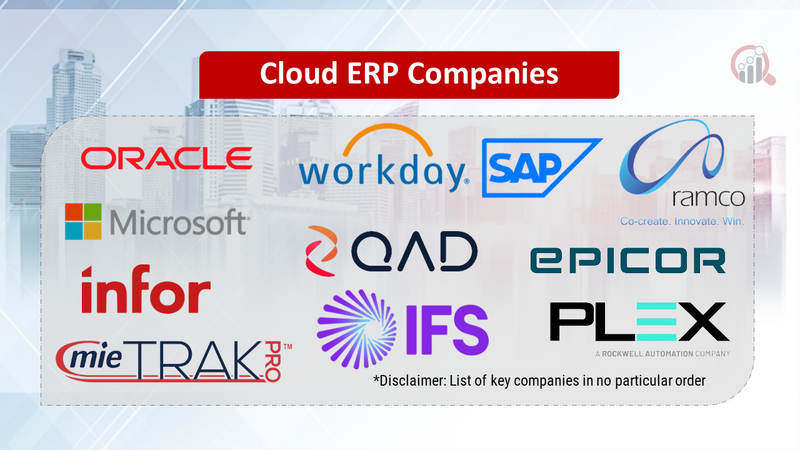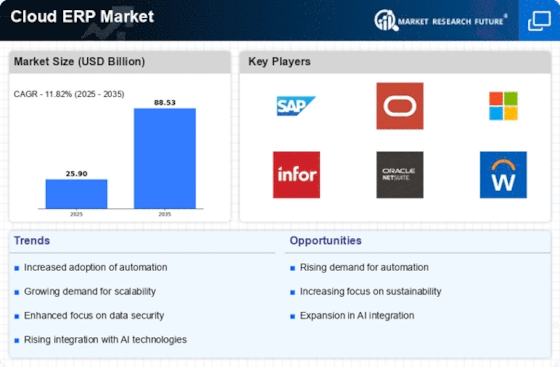Top Industry Leaders in the Cloud ERP Market

Navigating the Cloud ERP Arena: A Deep Dive into the Competitive Landscape
The cloud ERP (Enterprise Resource Planning) market is experiencing a meteoric rise, projected to reach a staggering growth by 2028. This rapid ascent has attracted a diverse band of players, all vying for dominance in this burgeoning landscape. Understanding the competitive dynamics is crucial for businesses seeking the right cloud ERP solution.
Key Players:
- Oracle (US)
- Global Shop Solutions (US)
- Genius Solutions (Canada)
- IQMS (US)
- SYSPRO (South Africa)
- Deltek (US)
- Epicor (US)
- Ramco System (India)
- Plex System (US)
- Workday (US)
- IFS (Sweden)
- SAP (Germany)
- Microsoft (US)
- Infor (US)
- Sage Software (UK)
- Acumatica (US)
- QAD Inc (US)
- MIE Track Pro (US)
- OpenPro (US)
Strategies for Success:
-
Specialization vs. Comprehensiveness: Players are choosing between offering comprehensive suites catering to diverse functional needs or specializing in specific areas like finance, HR, or supply chain management.
-
Cloud-Native Platforms: The shift towards cloud-native architecture is paramount, enabling scalability, agility, and easier integrations.
-
AI and Automation: Integrating AI and automation capabilities for data analysis, forecasting, and process optimization is a key differentiator.
-
Customer-Centric Focus: Providing exceptional customer service, including implementation support, training, and ongoing maintenance, is vital for customer retention.
Factors for Market Share Analysis:
-
Target Market: Focusing on specific industry segments or company sizes allows for deeper customization and market penetration.
-
Technology Stack: The underlying technology platform, its scalability, security, and integration capabilities, significantly impact a player's competitiveness.
-
Pricing and Deployment Options: Flexible pricing models, subscription options, and ease of deployment play a crucial role in attracting customers.
-
Regional Focus: Understanding the nuances of different regional markets, regulations, and industry dynamics is essential for global players.
New and Emerging Companies:
The influx of new entrants, particularly innovative start-ups, brings agility and fresh perspectives to the market. Some notable examples include:
-
Ramco Cloud ERP: Focusing on mobile-first platforms and industry-specific solutions for aviation and hospitality.
-
Unit4 ERPx: Offering flexible, modular solutions with a human-centric interface and strong social collaboration features.
-
Cloud ERP startups: A host of young companies are targeting niche markets like e-commerce or professional services with specialized cloud ERP solutions.
Current Investment Trends:
Investment in the cloud ERP market is booming, with both established players and venture capitalists pouring in funds. Key areas of focus include:
-
Artificial Intelligence Integration: Embedding AI in core ERP processes for intelligent automation, forecasting, and analytics.
-
Blockchain Integration: Exploring the potential of blockchain for supply chain transparency and secure data management.
-
Industry-Specific Functionalities: Deepening specialization in verticals like manufacturing, healthcare, or retail to offer best-in-class solutions.
-
Global Expansion: Established players are expanding their geographical reach to tap into burgeoning markets, while nimble start-ups are seeking strategic partnerships for broader presence.
Latest Company Updates:
-
Jan 5, 2024: Forbes: Increased competition in the cloud ERP space leads to consolidation, with Oracle acquiring Otonomo and Infor buying CRM software provider Agresso. -
Dec 28, 2023: ZDNet: Industry report predicts AI and machine learning (ML) to become integral features of cloud ERP systems, automating tasks and improving data insights. -
Jan 3, 2024: TechCrunch: Rise of vertical and industry-specific cloud ERP solutions catering to unique needs of different sectors like healthcare and manufacturing.










